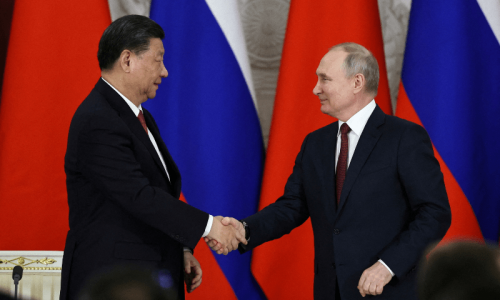KABUL: The Americans were widely heralded as liberators in Afghanistan, they had the world behind them, and they were able to hand over power to a credible opposition after ousting a disliked regime.
The United States and its allies seemed to have a strong hand after overthrowing the Taliban in late 2001, and as they contemplated the mammoth task of rebuilding the Afghan state from the rubble of war.
Turn to Iraq, and none of those advantages seem to apply. Washington’s hand looks a lot weaker as it considers how to put Iraq back together after the war.
The fact that it has arguably not played its cards well in Afghanistan gives cause for concern, analysts say.
“Afghanistan is complex enough but Iraq seems a much greater level of complexity,” said Tony Davies of Jane’s Defence Weekly in Bangkok. “You are not going to have the consensus around peace you had in Afghanistan.”
In Afghanistan, the Taliban movement was driven from power almost without a fight. American bombing campaigns in late 2001 did cause hundreds of civilian casualties, but the capital was seized not by a foreign invasion force but by an Afghan opposition alliance.
US and British forces have had to do all the fighting themselves in Iraq, and the fighting has been fierce. They have received a frostier reception from the Iraqi people, and mistrust seems to grow with each civilian casualty.
Arguably the footprint of the outside world has been too light in Afghanistan since the Taliban’s fall — many people would have liked to see foreign peacekeepers deployed around the country. The US footprint in Iraq will be much heavier.
If and when Saddam Hussein is ousted, Washington has said it intends to install a joint military-civilian government run by Americans, Iraqi opposition groups and other collaborators, rather than by the United Nations.
It is a unilateralist position which may not only leave more of the burden on the backs of American taxpayers, it also risks being rejected by the Iraqi people and by their Arab neighbours.
By contrast, the international stamp of approval has been vital in gaining the acceptance of the Afghan people.
NO CREDIBILITY: “A lot depends on how the US and Britain decide on how they want to govern a post-war Iraq,” said Mark Sedra of the Bonn International Center for Conversion. “A two- year military-civilian government would be a disaster.”
In Afghanistan, the opposition to the Taliban had roots in local society. In Iraq, analysts and many diplomats say exiled opposition groups lack any kind of credibility with the Iraqi people and could be seen as American puppets.
“In Afghanistan, the Americans had a leader with a vision (President Hamid Karzai) and a group of politicians more or less seen as national leaders,” said one diplomat in Kabul.
“The Iraqi opposition seems much more external. Even if they follow the model in Iraq we have followed here, they start from a less advantageous position.”
Afghanistan’s history of external interference taught the US government to make sure the country’s neighbours cooperated with the post-Taliban government. Worsening relations with Iran and Syria make that kind of regional consensus unlikely if not impossible in a post-Saddam Iraq, analysts say.
Despite all the differences, analysts say there are lessons to be drawn from the international community’s successes and failures in rebuilding Afghanistan since the Taliban’s ouster.—Reuters











































Dear visitor, the comments section is undergoing an overhaul and will return soon.